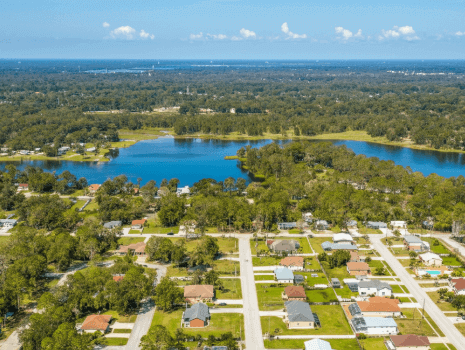When considering the investment of purchasing property, weighing both the advantages and the drawbacks is essential. In this blog, we will explore the specific disadvantages of owning land in Melrose, Florida. While this charming community offers many appealing features, potential landowners must know the disadvantages of owning land in Melrose, Florida, which can impact their decisions and future investments. Understanding these challenges will help prospective buyers make informed choices in land ownership.
Steve Daria and Joleigh, experienced real estate investors, have observed several key disadvantages when owning land in Melrose, Florida. One significant challenge is the potential for rising property taxes, which can impact the overall cost of ownership. Additionally, the area’s unique environmental concerns, such as flood zones, may deter investors looking for a hassle-free investment.
The Appeal of Melrose, Florida

Before diving into the disadvantages of owning land in Melrose, Florida, it’s essential to understand what makes this area attractive.
Melrose is known for its picturesque landscapes, tranquil lakes, and tight-knit community.
For many, these features make it an ideal spot for residential and recreational purposes.
However, while these benefits are significant, they often overshadow the underlying challenges of owning land here.
The Disadvantages of Owning Land in Melrose
While Melrose has its charms, potential landowners should carefully consider the disadvantages of property ownership.
Here are the specific issues that buyers should be aware of before making their investment in this picturesque community:
1. High Property Taxes
Melrose, like many parts of Florida, has relatively high property taxes.
This can pose a substantial financial burden for landowners, particularly those who rely on generating income from their properties.
Property taxes in Melrose are higher than the national average, which can deter potential buyers and affect resale value.
Understanding these tax implications is crucial for long-term financial planning.
2. Environmental Regulations
Florida is known for its stringent environmental regulations, and Melrose is no exception.
These regulations can limit what you can do with your land, from building restrictions to limitations on altering natural landscapes.
While these laws aim to protect the environment, they can be a considerable inconvenience for landowners wanting to develop or modify their property.
3. Natural Disasters
Florida is susceptible to natural disasters, including hurricanes, floods, and wildfires.
Owning land in Melrose puts you at risk of these natural events.
The cost of insurance can be high, and the damage from these disasters can be devastating.
This risk factor is something potential landowners must seriously consider.
Get Started: Get Your Cash Offer Below…
We are direct land buyers. There are no commissions or fees and no obligation whatsoever. Start below by sharing where your property is and where we can send your offer…
4. Limited Infrastructure
Melrose is a small town, and while its charm lies in its simplicity, this also means limited infrastructure.
There are fewer medical facilities, schools, and commercial establishments than in larger cities.
For landowners, this can translate into longer commutes and less access to essential services, affecting the overall quality of life.
5. Market Volatility
Real estate markets can be volatile, and Melrose is no exception.
Property values can fluctuate significantly and are influenced by broader economic conditions, local development projects, and seasonal trends.
This volatility introduces financial uncertainty, making it difficult to forecast the future value of your land.
6. Maintenance Costs
Maintaining land in Melrose can be more costly than expected.
Florida’s humid climate promotes rapid vegetation growth, requiring regular upkeep to prevent overgrowth and pest infestations.
Additionally, properties near water bodies may require frequent maintenance due to erosion and flooding risks.
7. Zoning Restrictions
Zoning laws in Melrose can be restrictive.
The zoning designation of your land might limit what you can construct and how you can utilize your property.
These restrictions can significantly impact your plans and overall investment strategy.
8. Limited Resale Market
The market for selling land in Melrose is limited.
While the area may attract specific buyers looking for a quiet, scenic location, the pool of potential buyers is smaller than in more urban areas.
This can complicate selling your property swiftly and at a favorable price.
9. Seasonal Accessibility
Certain areas in Melrose may become difficult to access during the rainy season.
Flooded roads and waterlogged land can limit your ability to reach your property.
This seasonal issue can be inconvenient, especially if you plan to use the land year-round.
10. Water Quality Issues
Water quality can be a concern in some parts of Melrose.
Higher levels of minerals and pollutants in the water can affect the land and any potential agricultural activities.
Conducting thorough water quality testing before finalizing any land purchase is essential.
11. Potential for Sinkholes
Florida is notorious for its sinkholes, and Melrose is not immune.
The geological composition of the area makes it susceptible to these sudden ground collapses, which can cause significant property damage and pose safety risks.
Investing in land insurance that covers sinkholes is advisable but can be expensive.

12. Community Restrictions
Some communities in Melrose have homeowners’ associations (HOAs) that impose additional rules and fees on landowners.
These can cover everything from property aesthetics to usage restrictions.
While HOAs can help maintain property values, they can also lead to conflicts and added expenses.
Frequently Asked Questions
Explore common concerns and queries about the disadvantages of owning land in Melrose, Florida, providing key insights to help potential landowners make informed decisions.
Are there specific environmental concerns to consider?
Yes, Melrose is located in a region prone to flooding and hurricanes.
Prospective landowners should assess flood zones or hazardous areas and potential environmental hazards before purchasing.
How does the local economy affect land ownership in Melrose?
The local economy may impact property values and resale opportunities.
Limited job prospects in the area can lead to a slower growth rate in property appreciation compared to more urban locations.
Is it difficult to develop land in this area?
Developing land in Melrose can be challenging due to zoning laws, environmental regulations, and the need for utility access.
It is advisable to consult with local authorities and professionals before proceeding with development plans.
Conclusion
The disadvantages of owning land in Melrose, Florida, require careful evaluation by potential buyers. From high property taxes and stringent environmental regulations to risks associated with natural disasters and limited infrastructure, these challenges can significantly affect the overall experience of land ownership. Understanding these factors is crucial for making informed decisions and ensuring that your investment aligns with your lifestyle and financial goals.
**NOTICE: Please note that the content presented in this post is intended solely for informational and educational purposes. It should not be construed as legal or financial advice or relied upon as a replacement for consultation with a qualified attorney or CPA. For specific guidance on legal or financial matters, readers are encouraged to seek professional assistance from an attorney, CPA, or other appropriate professional regarding the subject matter.
